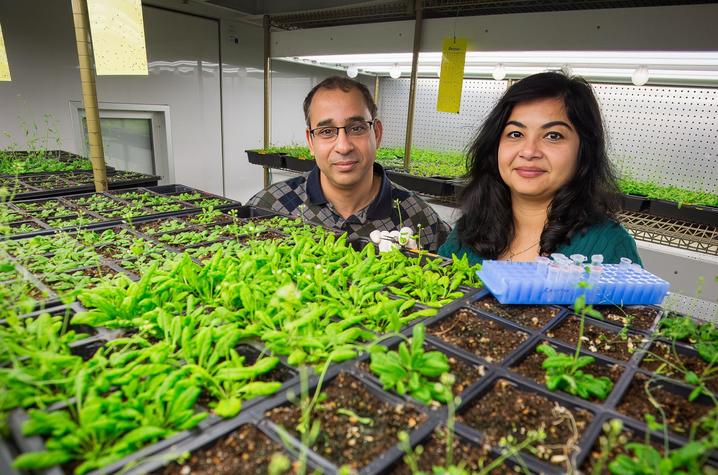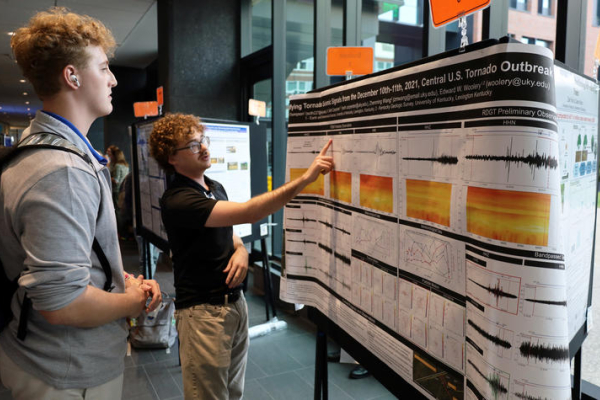From plants to people: How amino acid, vitamin balance links plant immunity to epilepsy

A groundbreaking study led by a team of researchers at the University of Kentucky’s Martin-Gatton College of Agriculture, Food and Environment has revealed a surprising biochemical connection between plant immune responses and human neurological health.
Researchers have discovered that the metabolic pathways regulating vitamin B6 homeostasis — critical in certain forms of epilepsy and immune function — are shared by plants and humans.
This study was published in the prestigious journal Nature Plants and supported with funding from the U.S. National Science Foundation and the National Institute of Food and Agriculture, part of the U.S. Department of Agriculture.
It highlights the importance of plant-based diets as a source of essential vitamins and amino acids, reinforcing the deep biochemical connections between plant resilience and human health.
Understanding these shared metabolic pathways opens new avenues for improving both crop resilience and human nutrition.
The study focuses on lysine catabolism. Catabolism, the breakdown of nutrients, is part of metabolism — the complex series of chemical reactions that sustain life. Lysine is an important amino acid required for protein synthesis, collagen formation, calcium absorption and the production of enzymes, hormones and antibodies.
Researchers found that plants produce Δ1-piperideine-6-carboxylic acid (P6C) as part of lysine breakdown, mirroring a process in humans where elevated P6C levels are linked to pyridoxine-dependent epilepsy. In plants, increased P6C levels disrupted vitamin B6 balance, depleting key forms of B6 and compromising systemic immunity.
“Our findings highlight the deep evolutionary processes that shape biochemical signaling across life forms,” said Huazhen Liu, Ph.D., the study’s lead researcher and a postdoctoral scholar in the Department of Plant Pathology in Martin-Gatton CAFE.
“The same molecular pathways that regulate plant immunity are also involved in human neurological health, emphasizing how fundamental metabolites like vitamins and amino acids have been conserved throughout evolution,” said Liu.
The study also sheds light on the evolutionary origins of these metabolic pathways. Researchers found that certain enzymes involved in lysine and proline metabolism in plants were likely acquired from bacterial sources through horizontal gene transfer. Over time, these enzymes were repurposed to safeguard vitamin B6 levels and detoxify short-lived, high-energy molecules known as reactive metabolic intermediates.
Beyond its implications for plant immunity, this discovery underscores the broader impact of diet on human health. Vitamin B6, found in many plant-based foods, is essential for neurotransmitter function, immune responses and metabolism. The research suggests that disruptions in amino acid metabolism could have widespread effects across biological systems, linking plant and human health in unexpected ways.
“It is important that we approach vitamin supplementation cautiously and rely primarily on plant-based diets to meet our daily nutritional needs,” said Pradeep Kachroo, Ph.D., professor of plant pathology in Martin-Gatton CAFE, an American Association for the Advancement of Science Fellow and a leading expert in plant systemic immunity.
The research team also includes Aardra Kachroo, Ph.D., professor of plant pathology in Martin-Gatton CAFE, along with their collaborators from the National Library of Medicine at the National Institutes of Health, SCIEX and the University of Warwick in Coventry, England.
You can find the full study online here.
Research reported in this publication was supported by the U.S. National Science Foundation under Award Nos. 0421914, 051909 and 0817818. The opinions, findings, and conclusions or recommendations expressed are those of the author(s) and do not necessarily reflect the views of the U.S. National Science Foundation.
This material is based upon work that is supported by the National Institute of Food and Agriculture, U.S. Department of Agriculture, under award number 13323564. Any opinions, findings, conclusions or recommendations expressed in this publication are those of the author(s) and do not necessarily reflect the view of the Department of Agriculture.
Credits
Words: Lindsay Travis (Research Communications)
Photos provided by Martin-Gatton College of Agriculture, Food and Environment)

